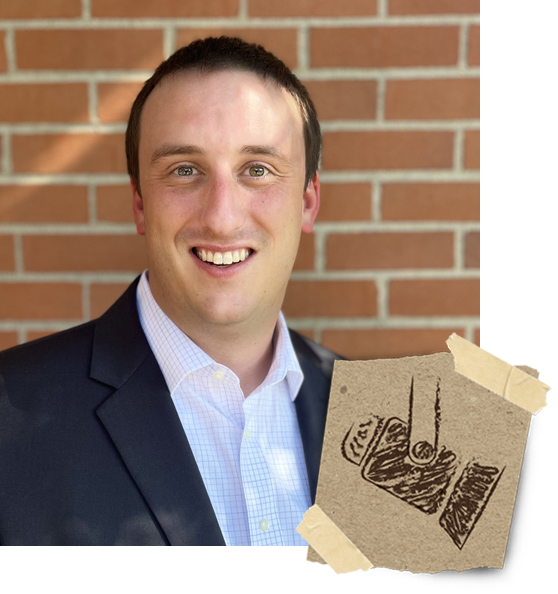Diversity Spotlight: Rabbi Simon Stratford
January 26, 2024 - Emily Jodway

Simon Stratford is a proud alumnus of the College of Social Science and currently serves as the Associate Rabbi and Director of Lifelong Learning at Temple Sholom in Cincinnati, Ohio. While at Michigan State, Stratford earned a degree in Social Work and completed a minor in Jewish Studies through the Serling Institute. He is being honored as part of Holocaust Remembrance Day for his community efforts to educate and enrich the lives of Jewish individuals and family through prayer, ritual and togetherness.
Stratford knew early on that he wanted to enter rabbinical school after college, and he pursued a social work degree with the thought that it would give him a great foundation on how to be a service professional and helping others.
“I think social work is one of the most versatile degrees anyone can get,” he explained. “It teaches you people skills and a certain worldview that allows you to care for others, and put caring for others and the greater good at the center of your life. That’s what I do every day as a rabbi, as a clergyperson and leader of a faith community.”
During his time at Michigan State, Stratford was involved in fraternity life, the Hillel system and the Serling Institute for Jewish Studies. He also had the opportunity to study abroad in Israel at Tel Aviv University. He credits several of his professors as important mentors who helped him along his way and gave him the confidence to continue his studies along to rabbinical school. He particularly enjoyed his time in Hebrew language class with Ellen Rothfield, Israel studies with Kristen Fermaglich and with Cindy Huey, the former director of MSU Hillel.
“[Cindy] was a great mentor to me,” Stratford said. “She was such a rock in the Jewish community at Michigan State, and she’s really well known. Everywhere I go people ask me if I know Cindy. I also got in touch with Kristen Fermaglich two years ago and had her do a virtual presentation for my synagogue on her thesis topic, which was really fun.”
Educating his congregation is a large part of what Stratford does in his work at Temple Sholom. He is the director of their religious school, and he manages educational and social programming as the Director of Lifelong Learning. He coordinates with community leaders and scholars to come in as guest speakers to supplement his teachings while also teaching classes of his own to children and adults of all ages. The lessons range from studies of Jewish texts and Hebrew scriptures to education surrounding a specific holiday or ritual when it occurs during the year. He describes the idea of ‘lifelong learning’ as an important value in the reformed Jewish community.
“One event I do every year is I put together a kid’s program for our High Holy Days, Rosh Hashanah and Yom Kippur,” he says. “It’s a really fun opportunity because it allows me to think creatively and bring Jewish traditions and customs to families and kids in a new way.”
Even when the past can seem so far behind us, Holocaust Remembrance Day serves as a reminder that the horrors many experienced during the Holocaust happened less than 85 years ago. This number can be seen as a juxtaposition between the fact of a tragedy being relatively recent, but its survivors also getting older and passing away. Stratford explained this phenomenon:
“The Holocaust wasn’t too long ago; it’s still in this lifetime for some people who are older. But it’s becoming more imperative that we share stories of survivors because they’re getting to be over 100 years old, they’re dying. So it’s all the more crucial that we remember and to commemorate those who survived and helped others, but also remember the atrocities and what can happen when we stop caring about each other’s humanity.”
Stratford also mentions the benefit of experiencing these individuals' stories in person when possible, by visiting local museums. While it may be hard to find opportunities to hear a Holocaust survivor speak in one’s own community, many museums offer educational videos and are even recording hours of interviews with them in order to create holograms of real survivors that people can visit and have a ‘conversation’ with.
“It’s pretty impactful,” Stratford commented. “It’s as raw as you could possibly get, regarding somebody sharing their own story. And then to see the numbers tattooed on their arm, something tangible and real … then getting to know them outside of that, it’s so powerful. A lot of Holocaust survivors see themselves as living testaments to the fact that Hitler did not win. It didn’t work; these folks are here, they have families and they’re still living their lives. They made it.”

